Items
Tag is exactly
military
-
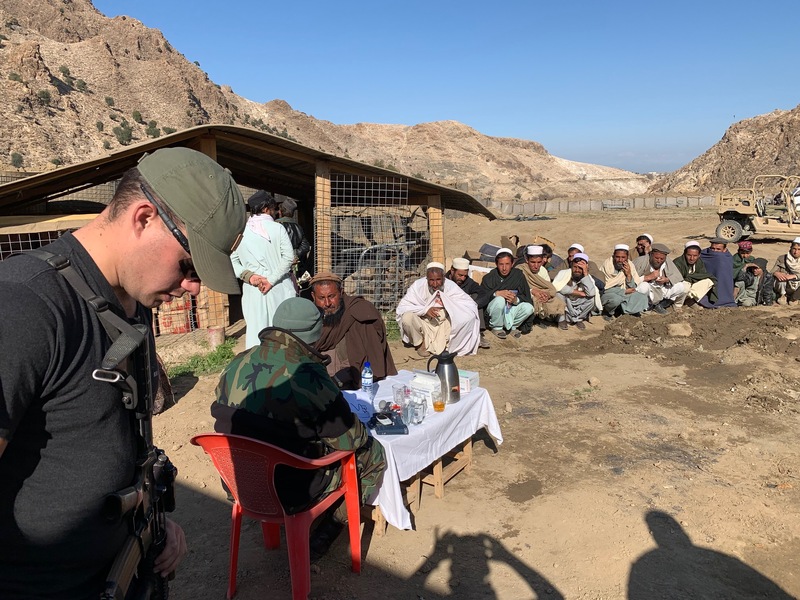 2020-02-18
2020-02-18Patients and Patience
I spent the majority of 2019 in Afghanistan. As far as deployments go, it was as busy as it was rewarding. I spent my days providing medical care to the local Afghans which included the handling of war wounds, managing chronic diseases, or treating any number of the infectious diseases that are endemic to the Middle East. My day-to-day activities had me in regular contact with sick people, and it was my responsibility to help them. Later in the year, a sickness began to go around. Across the country service members and civilians alike were coming down with what was presumed to be the flu. With consistently negative tests, however, medical professionals began looking to other causes for the wide range of symptoms people were suffering from. When I got sick, I lost my voice for a month and could barely walk out of my room without losing my breath and so I resolved to spending my time lying in bed and watching movies. When I returned home from Afghanistan in early 2020, I still wasn’t quite recovered. Unfortunately, my homecoming was not an elaborate affair as my wife and children were waiting for me in Texas where they had spent my deployment near family. The plan was for me to visit until it was time for me to move down there as well. I still suffered from shortness of breath and one day, shortly after returning, I nearly passed out on a light jog, and I knew something was wrong. I was scheduled to visit my wife and kids in the coming weeks, excited to see them after my deployment, but my unknown sickness had other plans in mind. At this point in the year, COVID was in its infancy, there hadn’t been any lockdowns or travel restrictions, only the lingering concern that this new disease could become a problem. So, naturally, when I went in to see the doctors for my persistent symptoms, it was an easy assumption that I had caught COVID early while in Afghanistan in the months prior. While investigating the cause of my ongoing issues, they found a nodule in my lungs. Apparently, my weakened immune system and constant contact with severely sick patients had resulted in me contracting tuberculosis. I was now a high-risk patient. The ironic thing is that my newly diagnosed condition was contagious, and not being near my family prevented me from spreading it to my wife or kids. So much for visiting family after my deployment. Over the next few months, I was treated with heavy duty antibiotics that left me puking in the mornings and unable to leave my house, which became easier and easier as COVID gripped the world. Flights were canceled and lockdowns were enforced while I facetimed my family 1,500 miles away. After my treatment was complete, I eagerly drove home on empty roads to see my family for the first time since I had left the year prior. I would intermittently make the drive a few more times before I made the official move down later that year. Three years later, I still remember, as I’m sure we all do, the frustrations that were ever-present at the height of the pandemic. I remember my own frustrations at the difficulty of traveling down to see my kids, something that hadn’t been part of our well laid plans before my deployment. I remember having to explain to three young children why I couldn’t come home and helping my wife explain why they could no longer go to the park, to school, or hang out with their friends. In the end, however, I am grateful. I am grateful because I am able to teach them, through their own personal experiences, that we are all in this together. When they express annoyance at ongoing COVID policies, which cost them personal convenience, I can recount to them the sacrifices they made in order to keep us all safe from my sickness as well as COVID. They have learned that being patient and considerate is as much for everyone’s else’s sake as much as their own and it’s a lesson that has translated across their lives today. -
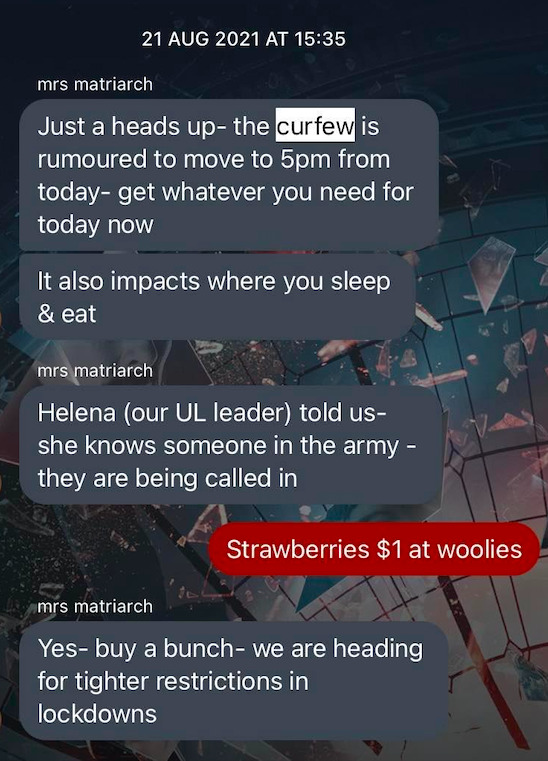 2021-08-21
2021-08-21HIST30060: Family Texts
This is a screenshot of a family text conversation in August 2021. The mother, nicknamed “mrs matriarch” on the Facebook Messenger application, is relaying rumours of an intensification of the lockdown restrictions, including the involvement of the military. She also encourages the popular practice of hoarding or panic buying. This conversation encapsulates popular anxiety around the suddenness of government responses to the pandemic. The user alerts their family based on a rumour that the 8pm Victorian curfew would be moved earlier to 5pm. In hindsight, the 5pm curfew never eventuated. Instead, the 8pm curfew became 9pm, before it was later removed. The user’s fear that the military would be involved further shows the anxiety felt by Victorian residents and the sense of entrapment. The conversation also indicates the popular phenomenon of panic buying and hoarding. The text reads, “get whatever you need for today now” and “buy a bunch – we are heading for tighter restrictions in lockdowns,” even for a perishable item like strawberries. Rumours had a very real effect on the population, prompting atypical economic behaviours, including the infamous toilet paper hoarding. The low price of strawberries reported by the user also illustrates the strange supply and demand for groceries during the pandemic and excess of fruit that year. -
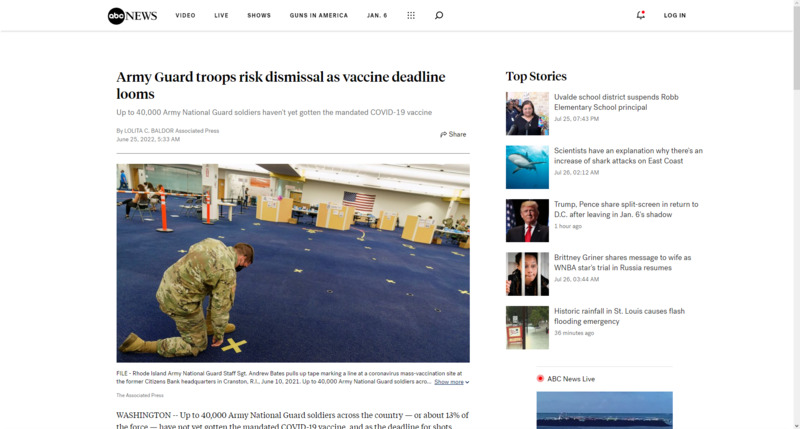 2022-06-25
2022-06-25Army Guard troops risk dismissal as vaccine deadline looms
This is a news story from ABC news by Lolita C. Baldor. Up to 40,000 National Guard soldiers, which consists of roughly 13% of the force, have not yet received the mandated COVID vaccine. Soldiers have until Thursday to get the vaccine. Out of all military branches, the National Guard was given the largest window to fulfill that requirement. -
2022-04-29
The Pandemic in the Military
When I found out about the start of lock downs and the fact that a pandemic was even happening, I was at the end of a training rotation at Fort Irwin, CA. My colleagues and I were extremely concerned about the welfare of our families as we had all been screened for symptoms, but there was talk of us not being able to return home until the DOD had figured out exactly how they were going to respond to the “sudden” emergency. I only put sudden in quotes because the government had plenty of warning that this was coming but decided that it wasn’t worth acting on until it had already started happening. Once home, the adjustment to a new way of life was akin to being dropped in a foreign country that speaks a language you don’t understand and has none of the customs you are familiar with. While families, dependents, and civilians had had warning, albeit minimal, that lock downs were going to be a thing and that masks were now mandatory regardless of where you were going, those who had been away without any media or contact back home, were suddenly thrust into the lifestyle of April, 2020. From that time to now, not only has vaccination and the reality of the virus become a contentious topic among coworkers, friends, and family, but what side of the issue you place yourself on has led to some of the worst division the nation has seen since the 1960s. Families have been ripped apart and friendships destroyed because the views expressed and sides taken on pandemic related issues, including the 2020 election, have adopted the same level of identity in our lives as our ethnic, racial, or religious backgrounds. Those who would have found common ground in shared religious belief, or shared culture now create new divides on the basis of believing that the vaccine works or not or believing that those who participated in the Jan 6, 2021 Capitol incident were justified or not. -
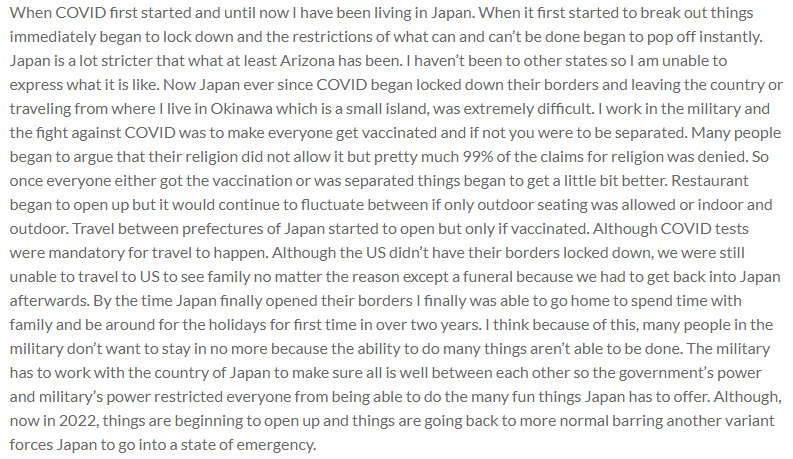 2022-04-27
2022-04-27Life of COVID in Japan
When COVID first started and until now I have been living in Japan. When it first started to break out things immediately began to lock down and the restrictions of what can and can’t be done began to pop off instantly. Japan is a lot stricter that what at least Arizona has been. I haven’t been to other states so I am unable to express what it is like. Now Japan ever since COVID began locked down their borders and leaving the country or traveling from where I live in Okinawa which is a small island, was extremely difficult. I work in the military and the fight against COVID was to make everyone get vaccinated and if not you were to be separated. Many people began to argue that their religion did not allow it but pretty much 99% of the claims for religion was denied. So once everyone either got the vaccination or was separated things began to get a little bit better. Restaurant began to open up but it would continue to fluctuate between if only outdoor seating was allowed or indoor and outdoor. Travel between prefectures of Japan started to open but only if vaccinated. Although COVID tests were mandatory for travel to happen. Although the US didn’t have their borders locked down, we were still unable to travel to US to see family no matter the reason except a funeral because we had to get back into Japan afterwards. By the time Japan finally opened their borders I finally was able to go home to spend time with family and be around for the holidays for first time in over two years. I think because of this, many people in the military don’t want to stay in no more because the ability to do many things aren’t able to be done. The military has to work with the country of Japan to make sure all is well between each other so the government’s power and military’s power restricted everyone from being able to do the many fun things Japan has to offer. Although, now in 2022, things are beginning to open up and things are going back to more normal barring another variant forces Japan to go into a state of emergency. -
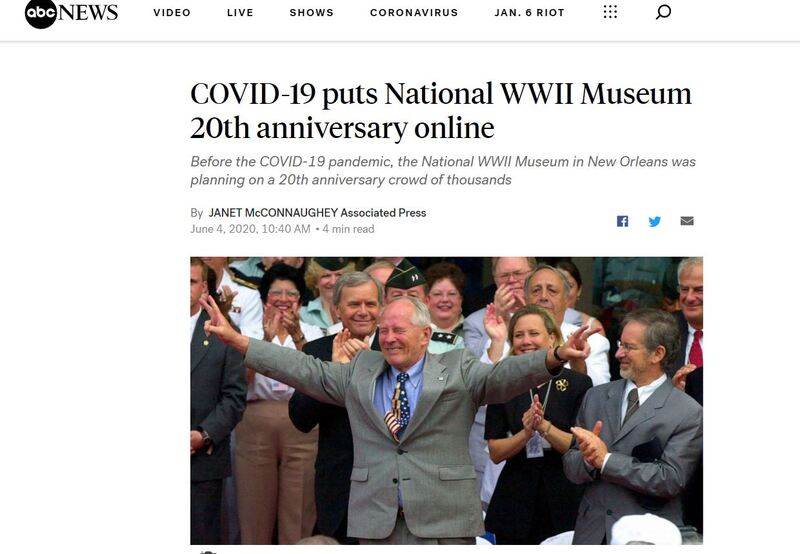 2020-06-04
2020-06-04COVID-19 puts National WWII Museum 20th anniversary online
This article details the holding of the 20th anniversary of the opening of the National WWII Museum in New Orleans on June 4th 2020. This is significant because thousands of people were supposed to attend, but now had to watch the ceremonies online as a result of the spread of COVID-19. This is an interesting contribution to the museum collection of the archive not only because the size of this event, but due to the fact that there are few military history museums mentioned in the archives. This is important to me as someone who studies military history, and because I was one of the many people spectating this ceremony online. -
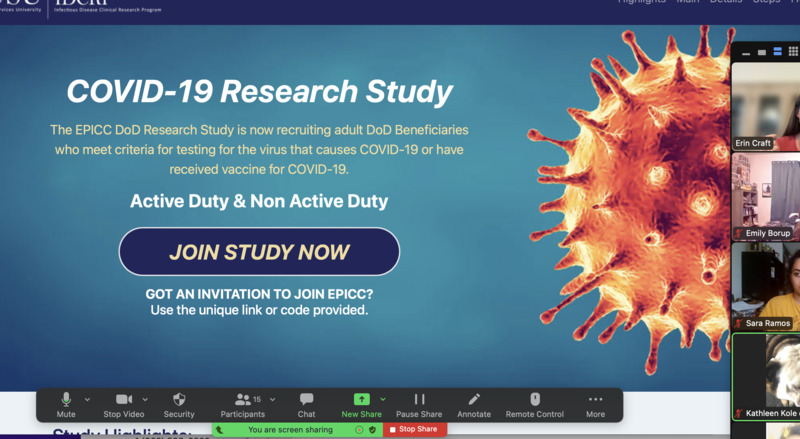 2022-03-27
2022-03-27EPICC Research Study
In October 2021 I was selected to voluntarily participate in the EPICC DoD Research Study on COVID-19. This study is focused on adulty active duty and non-active duty military service members who have tested for, had, or is vaccinated against COVID-19, and part of the Military Health System. I had never participated in a study before and honestly what hooked me was the $10 Amazon gift card they would give us for participating. Fast forward six months and I have completed three questionaries and one at-home blood sample kit. I think it's pretty cool to be participating in something that may improve the Military Health System overall and also provide data points for future research of COVID-19. Studies like this show how novel this virus really was and how we want to learn as much as we can about it in an effort to be more prepared for similar events in the future. -
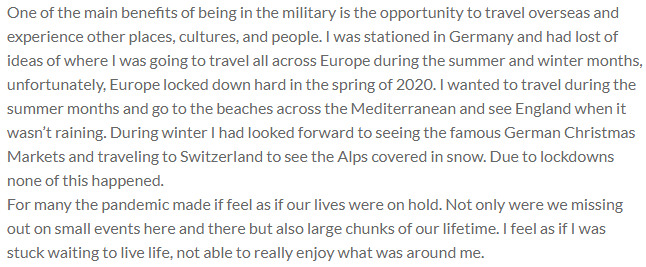 2020-12-31
2020-12-31No More Travel
One of the main benefits of being in the military is the opportunity to travel overseas and experience other places, cultures, and people. I was stationed in Germany and had lost of ideas of where I was going to travel all across Europe during the summer and winter months, unfortunately, Europe locked down hard in the spring of 2020. I wanted to travel during the summer months and go to the beaches across the Mediterranean and see England when it wasn’t raining. During winter I had looked forward to seeing the famous German Christmas Markets and traveling to Switzerland to see the Alps covered in snow. Due to lockdowns none of this happened. For many the pandemic made if feel as if our lives were on hold. Not only were we missing out on small events here and there but also large chunks of our lifetime. I feel as if I was stuck waiting to live life, not able to really enjoy what was around me. -
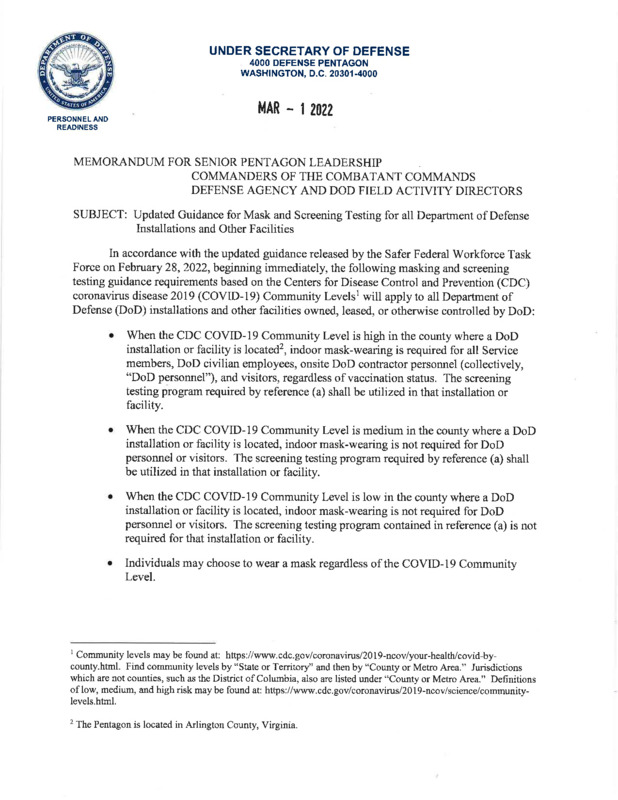 2022-03-01
2022-03-01Military Mask Guidance Update
The attached is a memorandum for record from the Under Secretary of Defense. This memo was published 1 March 2022 and was a big deal for us in the military and really everyone who works on military installations or in other Department of Defense facilities. Prior to this memo, we were all required to wear face coverings at all times when in doors, regardless of local state or county guidance. This memo was a great policy move as it changed the requirement from an overarching blanket policy to instead replicate local community guidance. I can tell you, we were very relieved to not be required to wear a face covering at all times. unlike many other sectors across the US, many military members did not have the opportunity to work from home during the pandemic. This is just due to the nature of our jobs, therefore we were masked up for a long time, even in places such as Texas and Florida where masks were no longer required according to local state and county guidance. -
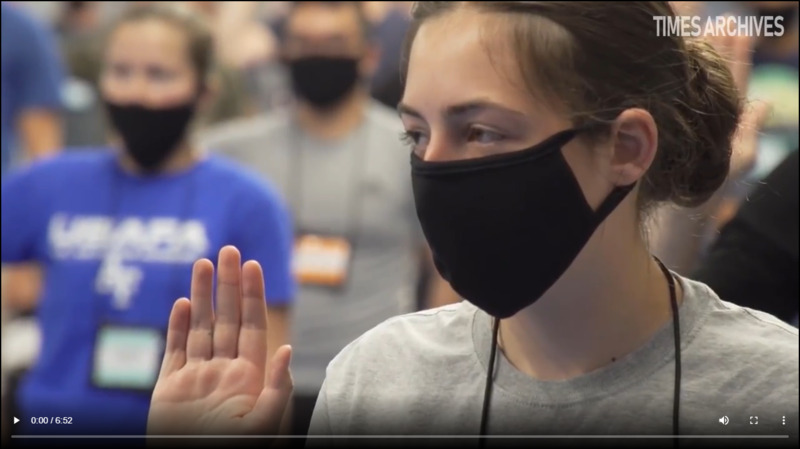 2020-06-25
2020-06-25In-Processing Day for the Class of 2024 at the United States Air Force Academy
Imagine yourself going into your senior year of college... but at a service academy while COVID-19 has sunken its teeth into every aspect of our lives. While most colleges and universities around the globe pushed back the start dates of their fall semesters in 2020 or moved entirely online, Service academies in the U.S. needed to meet congress' demand of supplying a steady stream of future commissioned lieutenants to the military. As a result, I found myself at 23 years old as a flight commander of 30 young, recent high school graduates who needed the same level of indoctrination I received into the Air Force four years prior. Rather than videos of years past with cadet cadre in the faces of soon-to-be freshmen screaming at the top of their lungs, this video provides the innocuous version of in-processing with unedited or dubbed audio. You might even see a few of my basics who didn't know what to expect of basic training during the pandemic. While the cadre in the film stand professionally and talk with a sense of authority towards the basics, I can tell you behind the scenes we were re-writing COVID-19 protocol and adjusting their syllabi as each day passed. Your authority as a military instructor weakens as its filtered through a wet, uncomfortable cloth mask (I strongly encourage you to look up "I-Day" videos of USAFA prior to the pandemic to compare). Can you imagine how much you have to yell through one of those masks to get 30 individuals to hear you over the other 39 flights sprinkled across the campus drill pads? My 6 weeks as a flight commander were filled with frustration, sympathy, reward, and most of all focus. First, focusing visually, I had to maintain social distancing anywhere from when basics were wrapped around the hallways to wait to shower all the way to when they practiced marching non-military standard "double-arm interval" for their basic training graduation day. Also, focusing through sound, I had to understand my basics through sweat or dirt covered masks as they recited knowledge, asked questions during academic blocks, or were struggling and needed follow-up mentoring. The measurable distance between trainers and trainees as well as the pauses of silence, normally filled with a constant cacophony of yelling, are what many graduates of my alma mater would call weak. Despite a lack of intensity, masks added a layer of confusion and frustration during a period that is already filled with fear, stress, and exhaustion for basics. For that reason, I want to ask those who weren't there to understand sensually why the class of 2024 still went through the same basic training experience as years past. Maybe a second listen to the audio can even reveal those same frustrations and fears from the basics reflected in the tone of their cadre. -
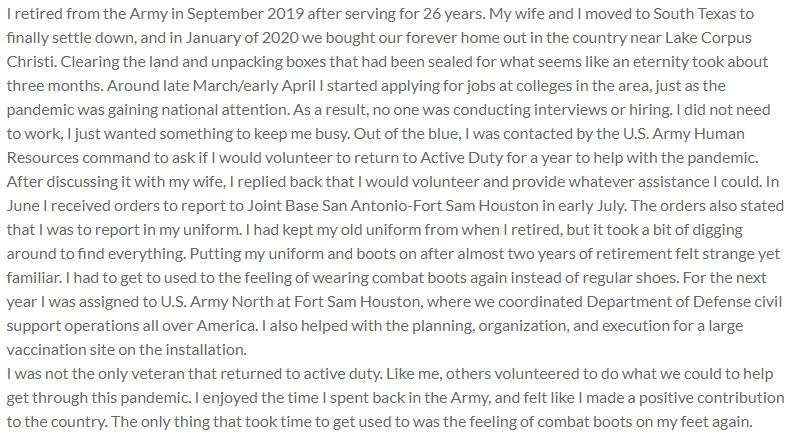 2020-07-09
2020-07-09Back in combat boots
I retired from the Army in September 2019 after serving for 26 years. My wife and I moved to South Texas to finally settle down, and in January of 2020 we bought our forever home out in the country near Lake Corpus Christi. Clearing the land and unpacking boxes that had been sealed for what seems like an eternity took about three months. Around late March/early April I started applying for jobs at colleges in the area, just as the pandemic was gaining national attention. As a result, no one was conducting interviews or hiring. I did not need to work, I just wanted something to keep me busy. Out of the blue, I was contacted by the U.S. Army Human Resources command to ask if I would volunteer to return to Active Duty for a year to help with the pandemic. After discussing it with my wife, I replied back that I would volunteer and provide whatever assistance I could. In June I received orders to report to Joint Base San Antonio-Fort Sam Houston in early July. The orders also stated that I was to report in my uniform. I had kept my old uniform from when I retired, but it took a bit of digging around to find everything. Putting my uniform and boots on after almost two years of retirement felt strange yet familiar. I had to get to used to the feeling of wearing combat boots again instead of regular shoes. For the next year I was assigned to U.S. Army North at Fort Sam Houston, where we coordinated Department of Defense civil support operations all over America. I also helped with the planning, organization, and execution for a large vaccination site on the installation. I was not the only veteran that returned to active duty. Like me, others volunteered to do what we could to help get through this pandemic. I enjoyed the time I spent back in the Army, and felt like I made a positive contribution to the country. The only thing that took time to get used to was the feeling of combat boots on my feet again. -
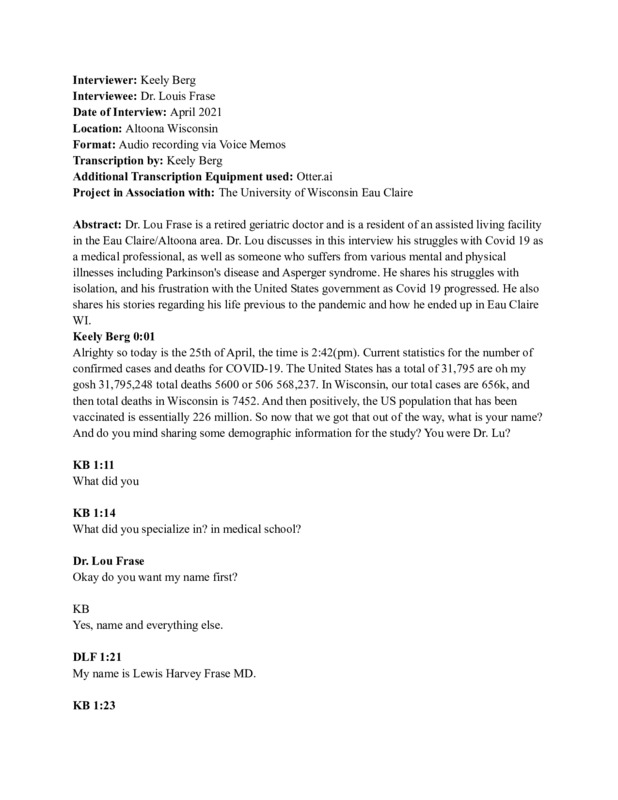 04/25/2021
04/25/2021Lou Fraise Oral History, 2021/04/25
Dr. Lewis Fraise details his service as a geriatric doctor during the Korean War and Vietnam War. He mentions his service in both Washington D.C. and Korea and continues to break down how the Coronavirus actually infects one's body and the response of the government as the pandemic ensued. Dr. Fraise criticizes the actions of Donald Trump and states that the spread of more medically-accurate information would have led to a better outcome in terms of the early stages of the pandemic. -
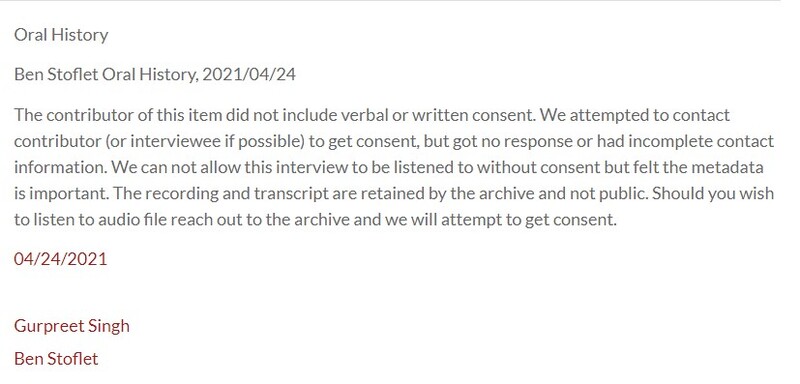 04/24/2021
04/24/2021Ben Stoflet Oral History, 2021/04/24
The contributor of this item did not include verbal or written consent. We attempted to contact contributor (or interviewee if possible) to get consent, but got no response or had incomplete contact information. We can not allow this interview to be listened to without consent but felt the metadata is important. The recording and transcript are retained by the archive and not public. Should you wish to listen to audio file reach out to the archive and we will attempt to get consent. -
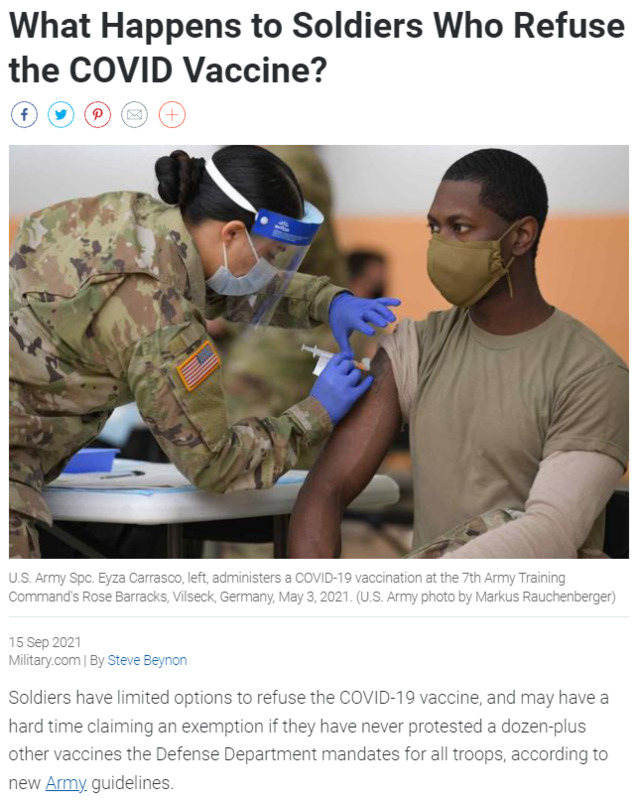 2021-09-15
2021-09-15What Happens to Military Who Refuse Vaccine?
This article talks about the recent vaccine mandate for all US military members and what some of the repercussions could be for those who refuse. Additionally, the article discusses how challenging it can be to get a valid exemption for this vaccine if military members have already consented to dozens of other vaccines during their careers. -
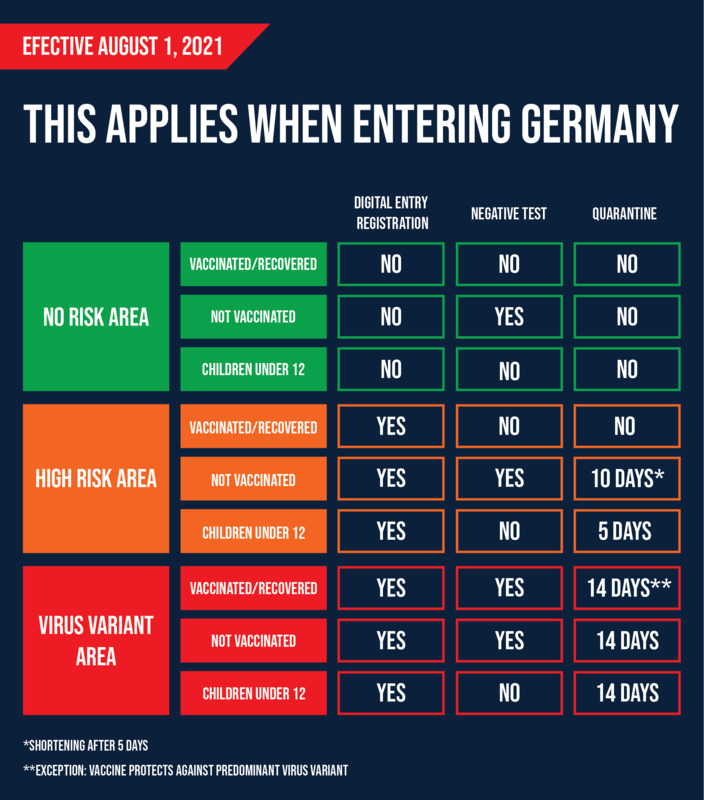 2021-08-01
2021-08-01Germany Travel Quarantine Guide
Germany would update its travel policy multiple times a month, depending on the number of COVID-19 cases in the country. As the rules would change so often, our command would release simple-to-follow articles that clearly explained what we had to do. This photo is a snapshot from an article that explains quarantine requirements when traveling into Germany from other countries. -
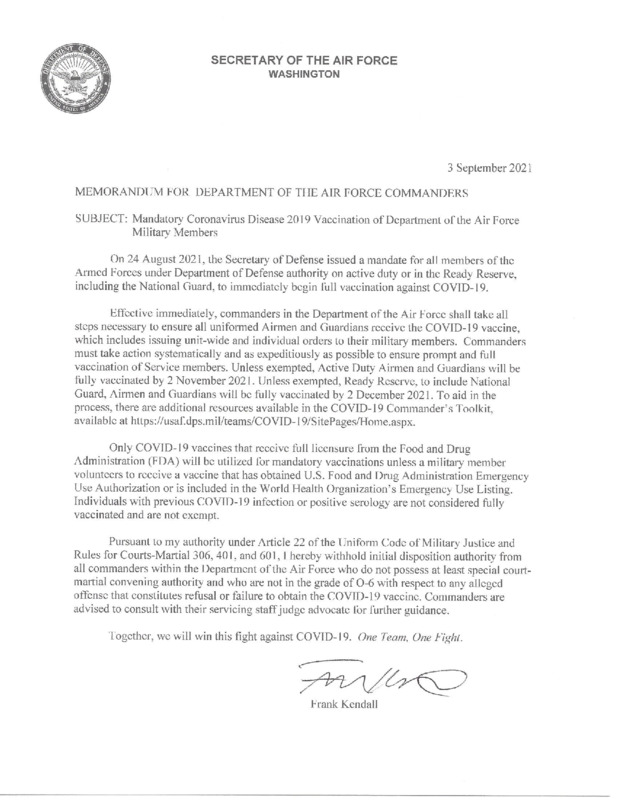 2021-09-03
2021-09-03Mandatory Vaccine for Military
Attached is a letter from the Secretary of the Air Force that mandates all Air Force and Space Force members must be vaccinated for the Coronavirus Disease by 2 November 2021. -
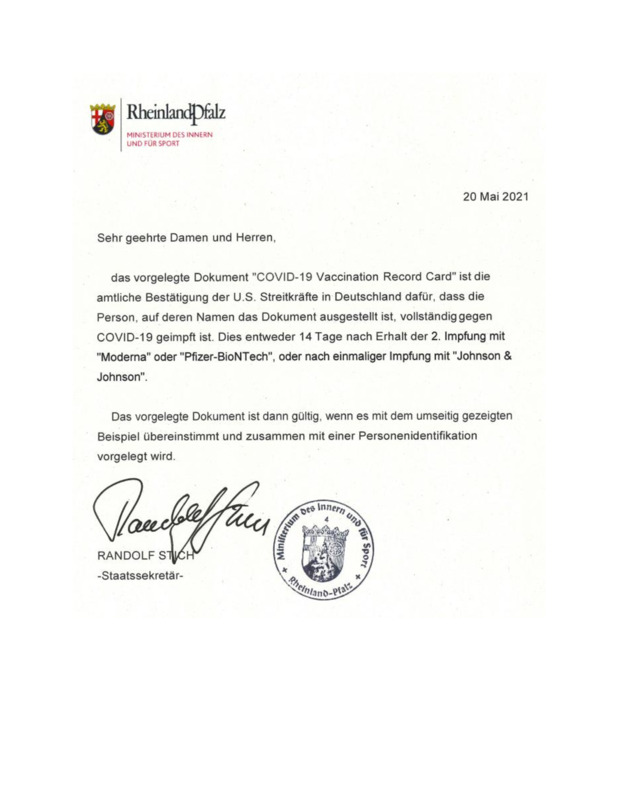 2021-05-20
2021-05-20US to German Vaccine Memorandum
The attached is a letter from the Rheinland-Pfalz state secretary that explains and validates the COVID-19 Vaccination Record Card that the CDC gives out with vaccinations. Many US military members in Germany received the vaccine, but our vaccine cards were not recognized by local German establishments as German and other European vaccine cards looked very different. In Germany, people were not allowed to eat inside restaurants if they were not vaccinated. By carrying the attached letter with our CDC-issued vaccine cards, we were able to visit local establishments. -
2020-08-31
My Story
I was in the military and on the opposite side of the country as my family when the pandemic began to take hold. Heavy restrictions were applied to those of us who were living on the base where I was stationed. At first the leaders within my organization said that restrictions would be temporary and would dissipate soon, if they were followed. The restrictions that we were required to follow were as follows: we couldn't leave the base, unless it was for essential travel (i.e. groceries), we could not be within six feet of each other, and we could not go into our friends rooms. While these restrictions were for our own good, it greatly reduced the quality of life for myself and my friends, because we could not hangout together like we used and most of our families were hundreds of miles away. Additionally, leave to go home was not being approved because of the restricted movement that was put in place. Eventually, the supposedly beneficial rules that were set in place to protect us, turned out to produce more scorn and hate for the people who made them, who didn’t care follow them, than they did good. After months of living like this, the rules became loose enough for people, who were from out of town, to come and visit. This being said, life for the first four or five months of the pandemic were full of totalitarian rules and heartache. Overall, life in the beginning of the pandemic was bleak and grey without any vision of color for the future. In August of 2020, my then fiancée and family were able to travel across the country to see me. The relief that I felt to be able to see my loved ones was indescribable and much needed. When they were in town, my wife and I got married and we were able spend a week with our families before they left for California. While, the relief that I felt was overwhelming and fantastic, I would never want anyone to live in forced separation from their loved ones, no matter the cost. -
 2020-08-15
2020-08-15The Covid Guard
The beginning of the pandemic almost perfectly overlayed with my beginning in the coast guard. From my first unit to A school, to my second unit as a rated member, Covid 19 has been a major part of every pit stop. I endure endless safety briefings to the now mandatory Covid 19 vaccine, the military did not fall short in its education and preparation for the pandemic. -
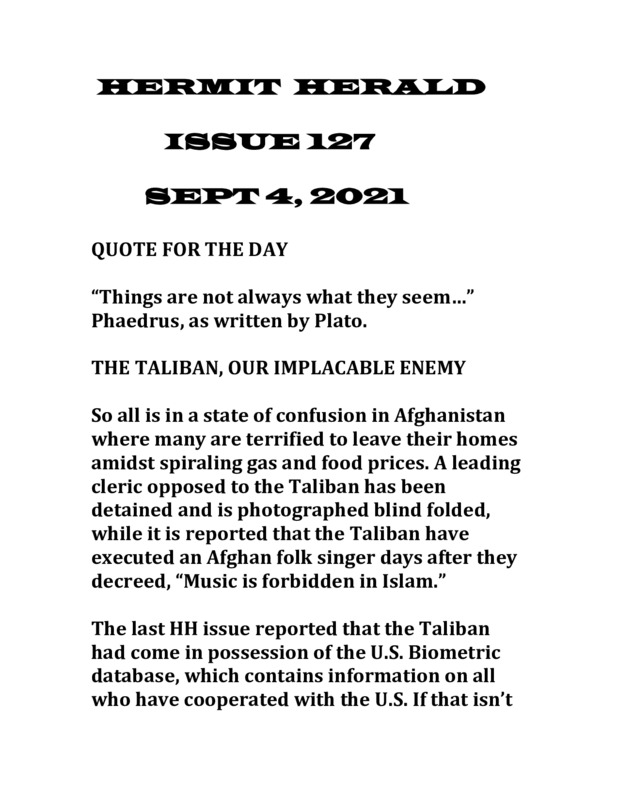 2021-09-04
2021-09-04hermit HERALD, ISSUE 127
Taliban need outside help -
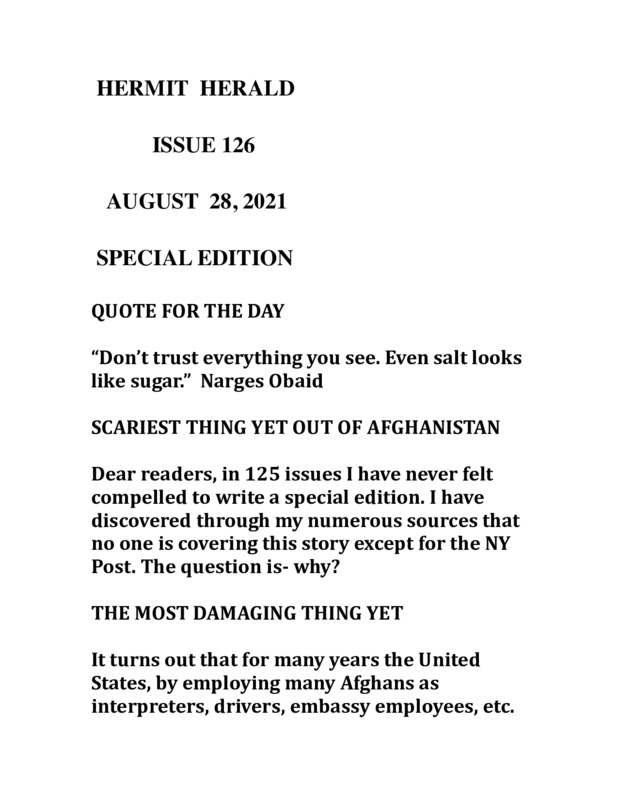 2021-08-28
2021-08-28hermit HERALD, ISSUE 126
U.S. biometric database in hands of Taliban -
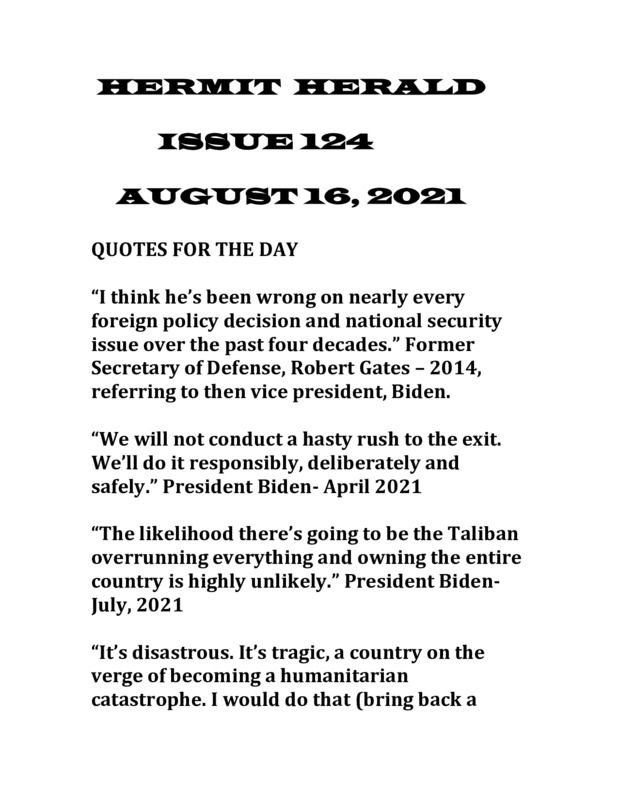 2021-08-16
2021-08-16hermit HERALD, ISSUE 124
Afghanistan government falls -
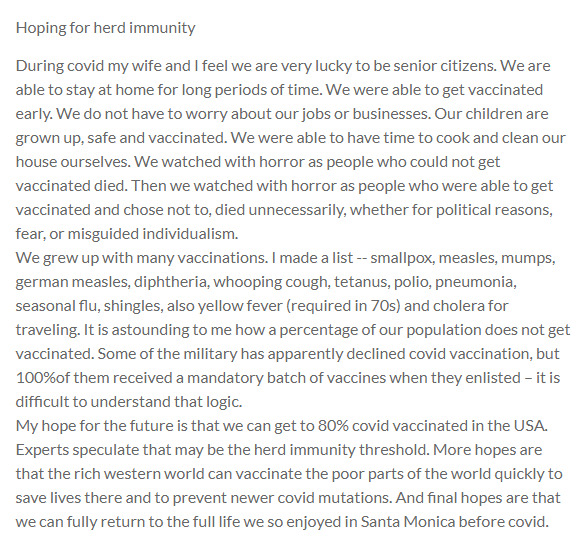 2021-08-11
2021-08-11Hoping for herd immunity
During covid my wife and I feel we are very lucky to be senior citizens. We are able to stay at home for long periods of time. We were able to get vaccinated early. We do not have to worry about our jobs or businesses. Our children are grown up, safe and vaccinated. We were able to have time to cook and clean our house ourselves. We watched with horror as people who could not get vaccinated died. Then we watched with horror as people who were able to get vaccinated and chose not to, died unnecessarily, whether for political reasons, fear, or misguided individualism. We grew up with many vaccinations. I made a list -- smallpox, measles, mumps, german measles, diphtheria, whooping cough, tetanus, polio, pneumonia, seasonal flu, shingles, also yellow fever (required in 70s) and cholera for traveling. It is astounding to me how a percentage of our population does not get vaccinated. Some of the military has apparently declined covid vaccination, but 100%of them received a mandatory batch of vaccines when they enlisted – it is difficult to understand that logic. My hope for the future is that we can get to 80% covid vaccinated in the USA. Experts speculate that may be the herd immunity threshold. More hopes are that the rich western world can vaccinate the poor parts of the world quickly to save lives there and to prevent newer covid mutations. And final hopes are that we can fully return to the full life we so enjoyed in Santa Monica before covid. -
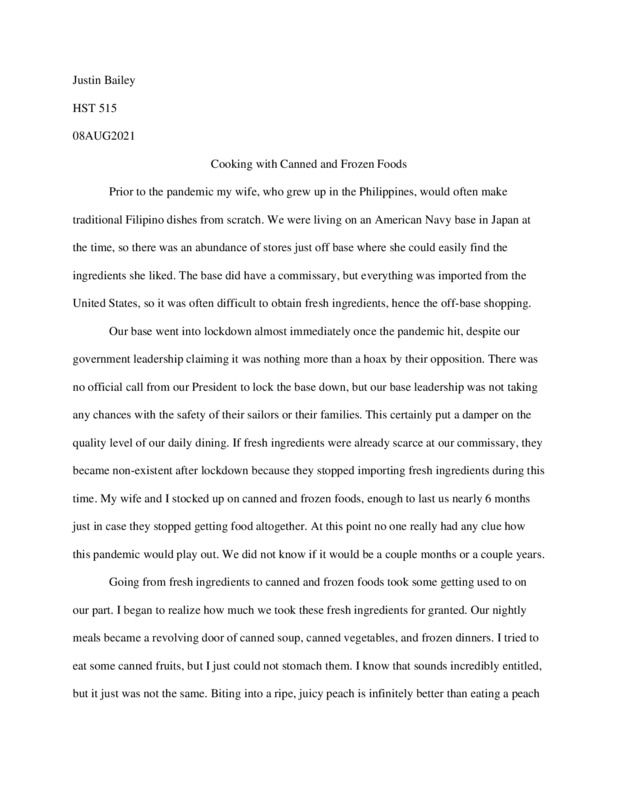 2021-08-08
2021-08-08Cooking with Canned and Frozen Foods
The file that I have included is a description of how My wife and I were essentially forced to resort mostly on canned and frozen foods for our meals rather than using fresh ingredients. -
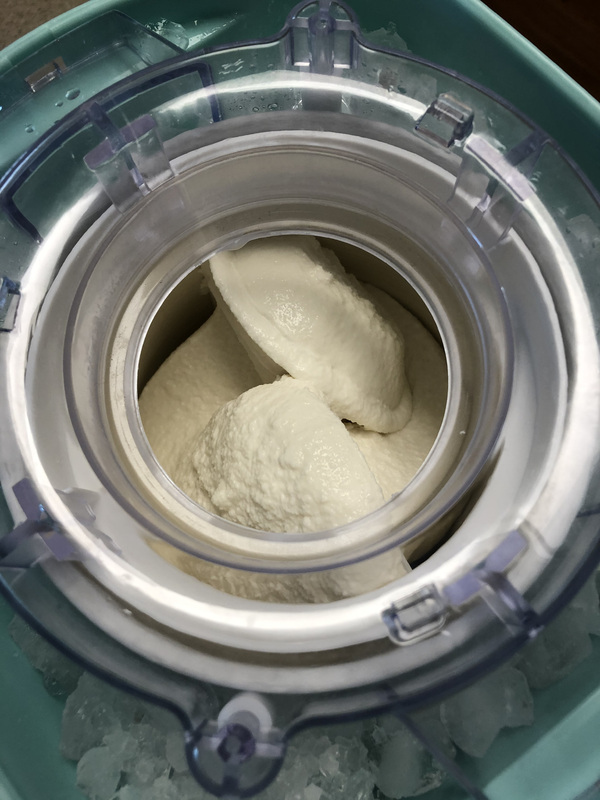 2020-04-14
2020-04-14Sweetness At Home During the 2020 Covid Pandemic
I had just quit my job on February 28, 2020 since my military spouse and I were about to PCS (Permanent Change of Station) from Camp Lejeune, North Carolina, to New Orleans, Louisiana in late March. Mid-March the DOD issued a Stop Movement order for all troops so we ended up not moving until it was lifted on July 1. During the wait, we were in limbo not knowing what would happen with our moving situation, but fortunately we still had our house and stuff. My spouse picked up Covid on our house-hunting trip to New Orleans the first week of March before the Stop Movement was issued, but was never diagnosed since there were not enough tests to go around in North Carolina. For about two months we stayed home together, enjoyed each other's company, and made the best of it. I spent a lot more time in the kitchen than was previously normal, and loved every minute of it. Two years previously, my spouse gave me an ice cream maker for Christmas, but I never took it out of the box and it ended up in one of my difficult-to-reach upper cabinets. When I was organizing my pantry and kitchen cabinets one day to prepare for the time we would actually get to pack up and move, I spied it and thought I would finally give it a try. I have wonderful childhood memories of sitting around with my family and grandparents outdoors while the homemade ice cream my mom and grandmother made, churned in the electric ice cream maker on a hot summers day. I called my mom for her recipe and found a similar one online to reference (published by the Taste of Home test kitchen). The military commissary was out of a lot of groceries, so I made an online order at Sams since they had still had milk and heavy cream, and picked it up. I already had plenty of sugar and vanilla in my pantry. Before Covid, I rarely had time (because of work and school) to make desserts, so this dish was a real treat, a simple recipe, and was super fun to make. The taste of homemade ice cream was so lovely and smooth, with texture velvety, eating it right from the churn. It brought back all the wonderful memories eating homemade ice cream with my family as a childhood, to comfort me during a time I could not travel to see them. Food memories like this can transport one to a time when the world was full of closeness with one's family, when forced to separate due to a world-wide pandemic. -
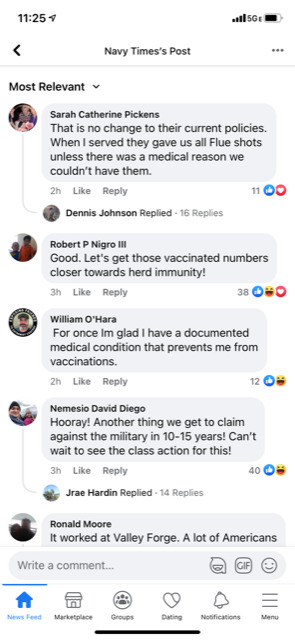 2021-08-05
2021-08-05SECDEF is expected to formally announce a mandatory vaccine policy for active-duty troops on Friday, according to Fox News.
I was active duty military for nine years and am now a reservist. My time in the military is almost done but I keep in contact with a lot of people who are still on active duty. I also keep myself up to date on military matters out of curiosity I guess. I am a corpsman in the Navy so I was really interested to see how the military would handle this pandemic. I was unsatisfied with the late response in a lot of matters (like masks and limiting gatherings) but this news is something that I am proud of. Working in the medical field out in the civilian world I have seen the impact of the COVID virus more than I would have to be on active duty. I have seen firsthand how relatively young and healthy people can become ill and die. I wanted to add some screenshots of the comment section to this post as well just to show that the military members are divided on the issue of vaccines just like civilians are. The difference is that active-duty members don't have a choice. If Uncle Sam says everyone needs to be vaccinated then that's what's gonna happen. Like someone on the comment section said "they injected us with anthrax, so I'm sure well fine with this vax shot" -
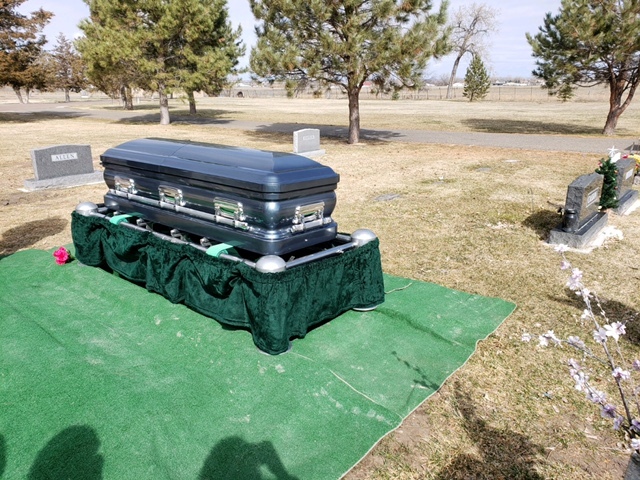 2020-04-06
2020-04-06Celebrating Life During Covid
The echoing silence is what stands out to me the most. Where there should have been “Taps” playing, blanks being fired in the air, and stories being told, there was nothing. On April 1, 2020, my grandfather passed away of natural causes. Under normal circumstances, my parents and I would have traveled up to Montana to attend his funeral. However, due to the fact that my father and I are immune-compromised, we were unable to attend. Even if we were able to make the trip, there was the possibility that we would not be able to attend the service. The funeral home only allowed ten people to be at the funeral, masked-up and socially distanced. On the day of the funeral, April 6, 2020, my parents and I attended the funeral virtually. We were sitting in the car (my parents were at work) watching the funeral on a FaceTime call with my sister. The service was extremely short. The funeral home wanted to make the service as quick as possible to limit potential exposure. This meant there was no eulogy, no military honors (he was an Air Force veteran), and very little time for the sharing of stories of personal stories. Thus, the service was oddly quiet. Funerals are typically quiet, but this was something more. There were tears, but the tears were hallowed. A lot of the emotion involved with a funeral comes from the memories shared. These tears are not all sad tears. This is because a life is being celebrated, all the ups and downs. The tears at my grandfather’s funeral were all sadness. Sad tears sound different than happy tears. Happy tears are often associated with laughter, something lacking at this funeral. Another sound that was absent during my grandfather’s funeral was his military honors. Typically, at a funeral that involves a veteran, there are a few things happen: “Taps” is played, a rifle detail fires blanks into the air, and a burial flag is presented to the next of kin. My grandfather did not receive military honors at his funeral. Thus, these sounds were not present. My grandfather’s funeral was the closest thing to silent as can possibly be. Covid prevented my grandfather from having the funeral he deserved. Fortunately, my family was able to give him a proper celebration of life in June 2020, which involved everything that had been missing at his funeral. The sounds of happy and sad tears were present, along with the sounds of full military honors. I am glad we were able to accomplish this, but to me, it felt different. The memories of his “silent” funeral were still engrained in my mind, causing me to have mixed emotions of sadness and anger that were not able to properly celebrate him at his funeral. -
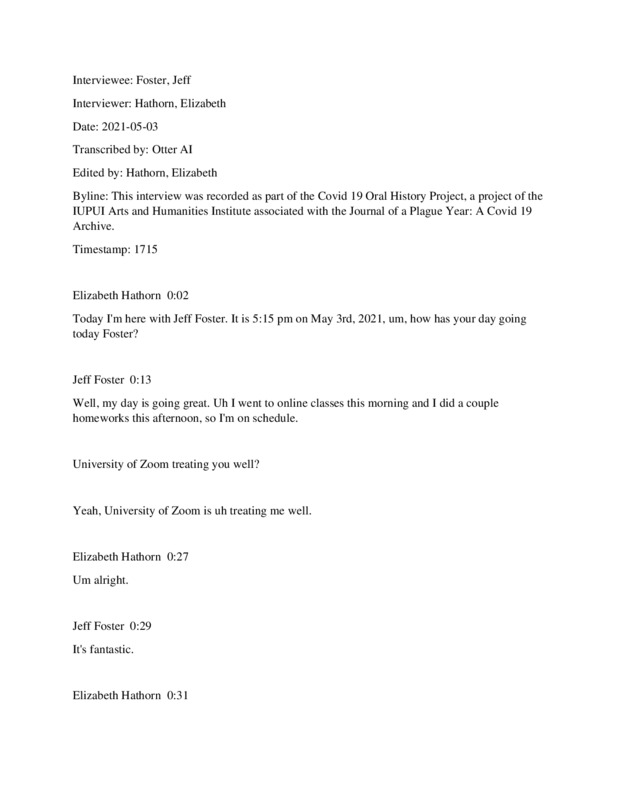 05/03/2021
05/03/2021Jeff Foster Oral History, 2021/05/03
Elizabeth Hathorn interviews Jeff Foster, a college student and member of the U.S. Army. He discusses the effects of COVDI-19 on college classes and on military training. He also touches on a few other aspects of life during the COVID-19 quarantine. -
2021-04-23
What life was like in the Military with COVID-19
My story is very similar to all my fellow military members. -
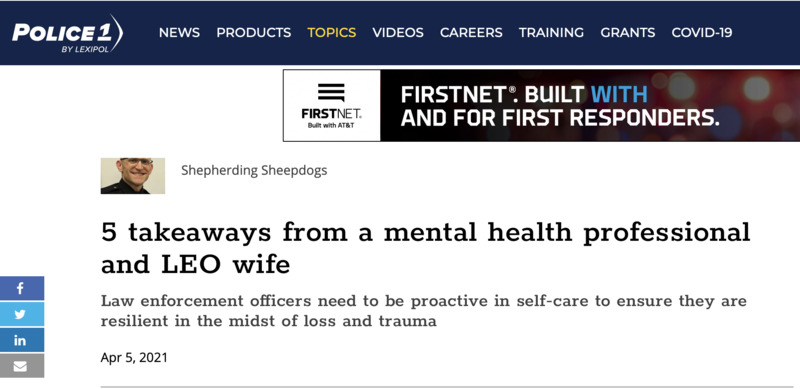 2021-04-05
2021-04-05Online Article: Law enforcement officers need to be proactive in self-care to ensure they are resilient in the midst of loss and trauma
This article discusses guidance for law enforcement professionals to adopt better self-care practices through this pandemic and the increased volume of vicarious trauma, depression, anxiety, and suffering prevalent in our societies. The author specifically addresses the problem of police suicide, which is often committed at similar rates to military combat veterans. While the article's content helps officers potentially deal with the difficulties of their calling, it might also help the public better recognize the darker and unwelcome realities of police work. -
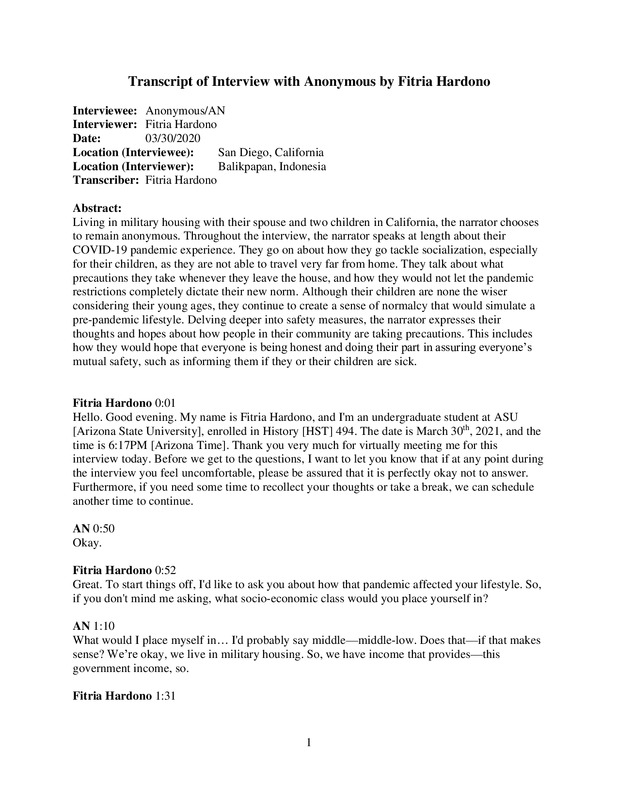 03/30/2021
03/30/2021Anonymous Oral History, 2021/03/30
Living in military housing with their spouse and two children in California, the narrator chooses to remain anonymous. Throughout the interview, the narrator speaks at length about their COVID-19 pandemic experience. They go on about how they go tackle socialization, especially for their children, as they are not able to travel very far from home. They talk about what precautions they take whenever they leave the house, and how they would not let the pandemic restrictions completely dictate their new norm. Although their children are none the wiser considering their young ages, they continue to create a sense of normalcy that would simulate a pre-pandemic lifestyle. Delving deeper into safety measures, the narrator expresses their thoughts and hopes about how people in their community are taking precautions. This includes how they would hope that everyone is being honest and doing their part in assuring everyone’s mutual safety, such as informing them if they or their children are sick. -
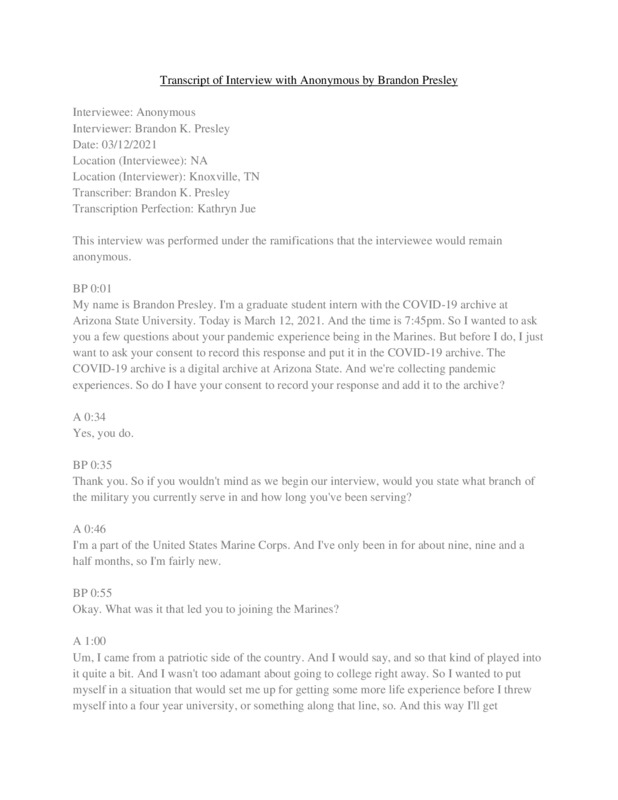 03/12/2021
03/12/2021Anonymous Marine Oral History, 2021/03/12
Interview with a Marine that details going through Basic Training during COVID-19. -
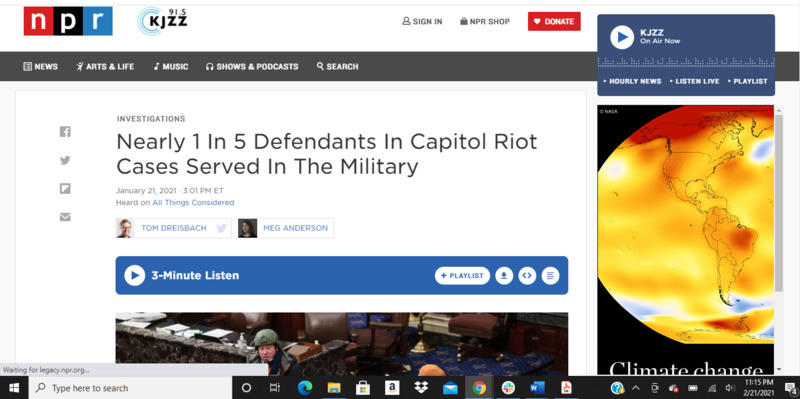 2021-01-21
2021-01-21Nearly 1 in 5 Defendants in Capitol Riot Cases Served in the Military
The article discusses the Capitol riots and the veterans who participated in them, as well as recent extremist behavior within the military and the government's response. -
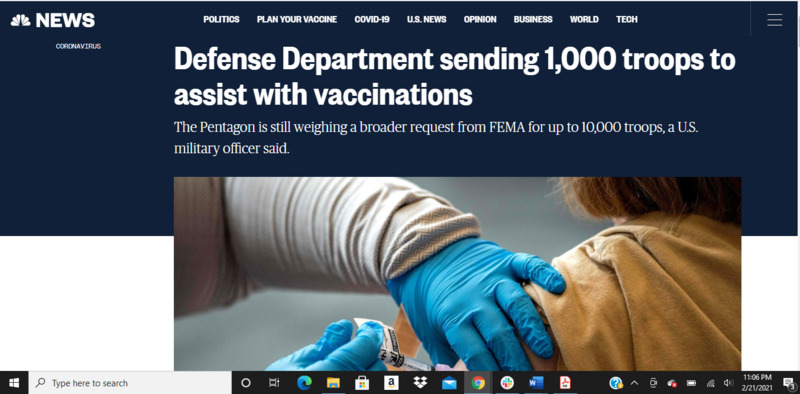 2021-02-05
2021-02-05Defense Department sending 1,000 troops to assist with vaccinations
The article discusses the federal government's aid in California, where they would be sending troops to assist with vaccinations, as well as open two federally run vaccination sites in order to ensure that anyone wanting a COVID-19 vaccine would be able to get one. -
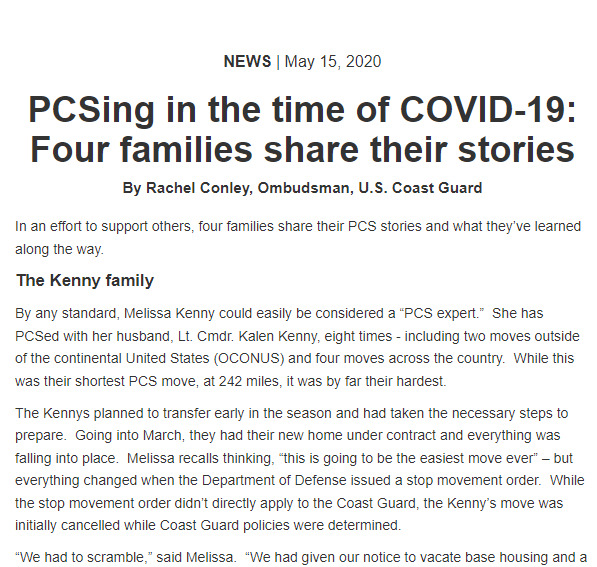 2020-05-15
2020-05-15"PCSing in the time of COVID-19: Four families share their stories"
This story follows four military families as they prepare for Permanent Change of Station (PCS) orders. The process is further complicated due to COVID-19 restrictions. Each family shares how they had to adjust routine travel plans; taking into account state-by-state orders as well as trying to navigate schooling for children. While PCS orders are a reality of all military members, during 2020 there were significant changes delivered by the Department of Defense. -
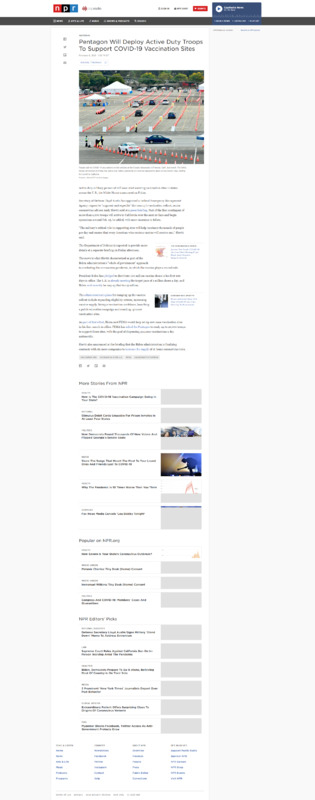 2021-02-05
2021-02-05Troops to Help with Vaccine Roll-Out
The White House announced that 1,000 troops will be deployed to California in the next few weeks to aid with the vaccine roll out process. This is a single part of the Biden administration's "whole government" approach to ended the virus. The administration is already setting the goal of 1 million doses per day and may up that to 1.5 million. -
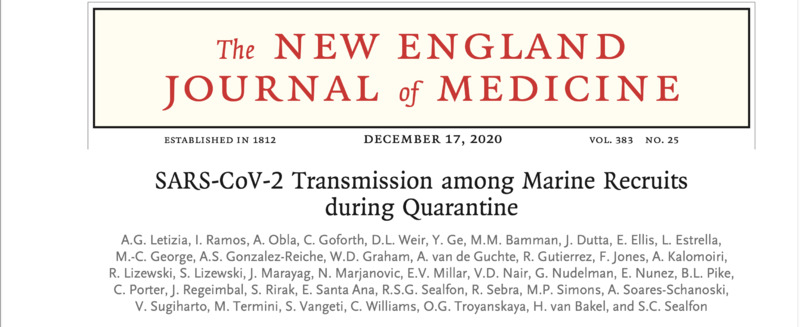 2020-12-17
2020-12-17SARS-CoV-2 Transmission among Marine Recruits during Quarantine
This is an academic article that discusses the transmission of Covid-19 among Marine recruits in quarantine. Due to the pandemic, recruits have been forced to quarantine before they were able to begin their basic training. Marines were sent to a college campus where they practiced social distancing for two weeks before going to training. This study shows the effectiveness of quarantining, social distancing, and mask-wearing -
2020-12-05
Reflections on working at a US Military Hotel/Quarantine Facility and Getting Tested for COVID
In this story I would like to share some of my experiences working at a Hotel that was converted into a quarantine facility for the US Military. I am a civilian employee of a US Army Lodging facility on a US Army base overseas. As a part of my job, I assist soldiers in finding temporary lodging during their permanent change of station (PCS) moves, as well as finding lodging during temporary deployments in our area. In many ways, our facility works as a hotel with an emphasis on long term stays for guests. By early February we had begun to take measures of tracking where people were traveling from and if they had any contact with people who had be sick or were sick themselves. In March, as the pandemic was heating up in Europe, many local hotels were forced to close, yet to support the military mission, we remained open and even converted a portion of our facility into a quarantine facility for US Military personnel. Establishing the new standard operating procedure for handling quarantine was difficult since we needed to coordinate it with local German Laws, Garrison policy and the policies being set by the local combatant commands. This often led to confusion and frequent changes in daily routine and standard operating procedure. When coming to work, things would change almost daily. While the Garrison went to partial manning as those who could work at home did, I was working double shifts to help in the conversion of our facility and the writing of the new SOP’s to deal with our changing circumstances. Large plexiglass windows were added to the Front Desk and all our office spaces. Per garrison orders mask wearing became mandatory throughout the facility except for guests inside guest rooms. Wearing masks for hours on end, and frequent sanitation runs to wipe down the stairways and elevators and lobby became the norm. Given the importance of maintain health and readiness, the Military took the situation vary seriously in terms of sanitation and protection measures. When One of my colleagues had tested positive for COVID, the others she had direct contact with were placed in Quarantine and sent to be tested as well. They were required to have two negative tests 5 days apart before they could leave quarantine. When I became sick with flu-like symptoms, I was sent to be tested for COVID. The Garrison established a drive through testing area. The test consisted of a nasal swab, which could be done either as the less invasive swab just inside the nose, or the more invasive same day test which required the swab to be taken deeper in the nose for 10 seconds. After filling out a questionnaire, they determined that I needed the more invasive test. After reaching the end of the line, I leaned out of the window of my car they tested me. It was a rather painful experience. Within 8 hours of the test, I was able to access my test results online. Luckily, I tested negative. As it turns out I had only a regular seasonal flu. If I had tested positive, I would have been contacted by a training team on the same day of my test, and the colleagues that I worked with would have had to enter quarantine as well. Since I tested negative, I only had to remain at home away from work until 48 hours after my last symptoms. Attached is a copy of the COVID testing information sheet provided to me after my test. -
2020-03
Stuck In The North
I was serving in the Norwegian Army when COVID-19 came onto the scene. My base, Skjold Leir, was one of the first places in Europe to react to the virus. Immediately after it was perceived as a threat, my base shut down, and put the soldiers into quarantine, leaving us stuck inside our rooms in the barracks. My company, which was a part of the Engineer Battalion, had spent the last two weeks preparing for Cold Response 2020, a major international military exercise, meant to train and expose soldiers from all over the world to the severe elements of Troms, in the north of Norway. This event was unfortunately canceled, due to the newly arisen threat of the CoronaVirus. The members of my squad and I got stuck in our rooms quarantining for five days. We tried to keep ourselves occupied to pass the time. We began to hear news of mass lockdowns taking all over Europe, with the United States closely following suit. Although there were some who were hopeful that this might be over by Easter, it became quite apparent that things would not get better any time soon. After our quarantine, there was a malfunction in one of the gates at the back of the base. The gate would not close, so more soldiers were needed on both day- and night-shifts to ensure that our base was not compromised. The entire base needed to be patrolled constantly as well. This assignment lasted two weeks. I was chosen to serve on the night-shift. I found it extremely difficult to adjust my internal clock to stay awake all night and sleep during day-light hours. At times, I found myself sleepwalking while standing in front of the main entrance, not among one of my most proud moments. Thankfully, we were assigned partners, and we were instrumental in helping each other in staying awake and focused. Although the first few nights of the night-shift had been rough for us, we quickly adjusted to it. It would not be until after we were done with our two-week overnight-shift that the gate finally got fixed. Fortunately for us, however, we managed to find a way to seal it shut during the night, thus lessening the workload. After our two week shift was over, we quickly began with our normal routines. Other than the local gym and movie theater being closed, as well as each barrack in our base needing to take turns going to the mess hall to have breakfast and dinner, business was still running as usual. An unfortunate consequence of the pandemic was that soldiers could not leave base, which meant that all of our vacations were cancelled. For some of us, this would be a trying period, as the pressure of being trapped in base for so long without going home increased the amount of depression in our squad. My base took some preventative measures to keep its soldiers content and motivated. They organized sport events, as well as other fun things to keep us preoccupied, some of which I helped to set up and run. This, unfortunately, would not be enough for a few of the soldiers on base. Some of them ended up quitting the army, sheerly out of the stress caused by not seeing their loved ones for months on end. Even I at some point had a brief panic attack, as the pressure of being in this same place for so long affected my morale. I am proud to say that I managed to pull myself back together, and refused to quit. I was determined to see my obligatory service in the Norwegian Military through to the end. For all our extraneous duties, we were awarded with a two week leave. To finally come home after many months of service was a great joy. I was so happy to see my parents, my brothers, my friends, as well as my dogs. I also brought with me a great sense of pride and accomplishment. -
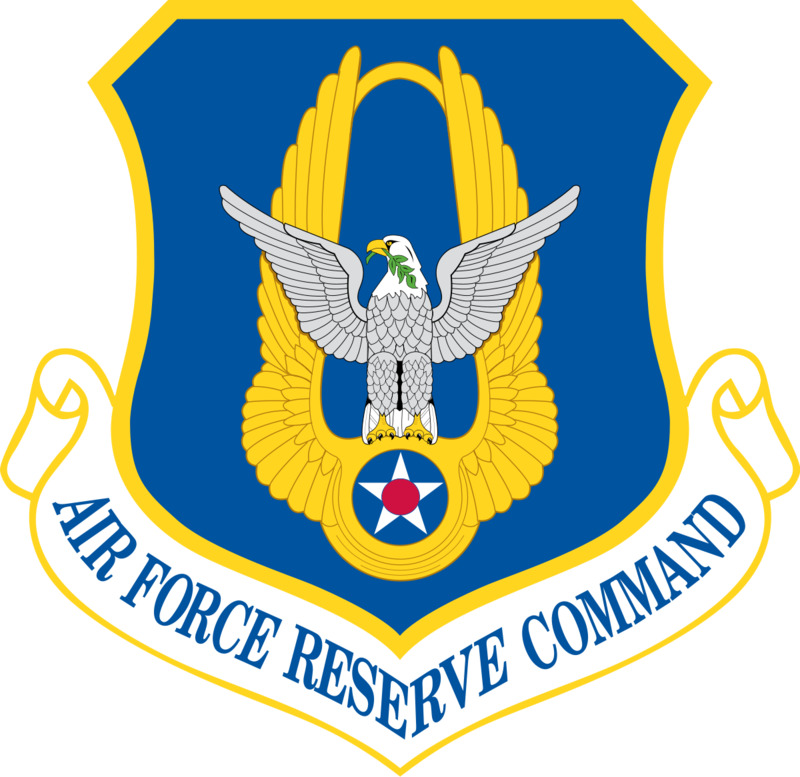 11/16/2020
11/16/2020Anonymous Active Air Force Reservist Oral History, 2020/11/16
This is a audio interview with a active Air Force Reservist, describing how the Covid pandemic has impacted his work environment and personal livelihood. -
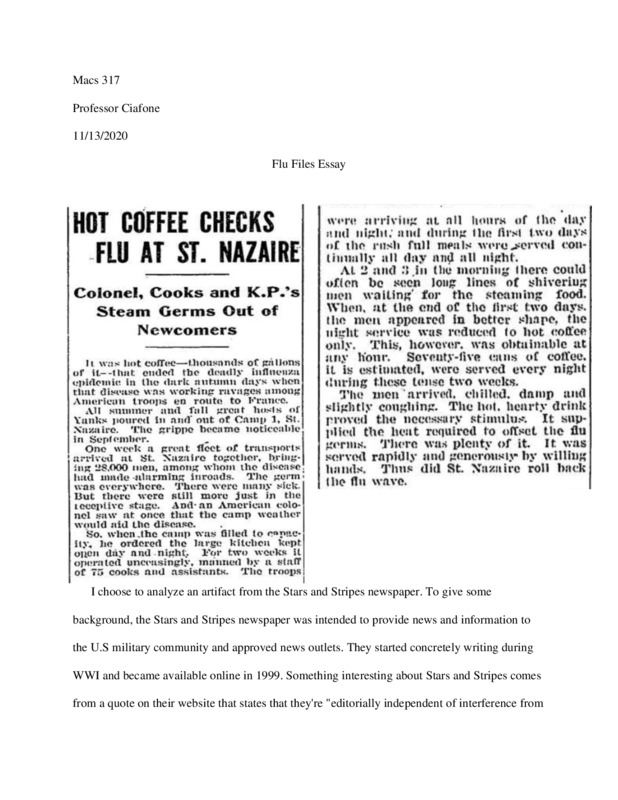 0011-11-12
0011-11-12Repeating History
I compared something that was written about the Spanish Flu in 1918 to something that was said about Covid-19 in 2020. -
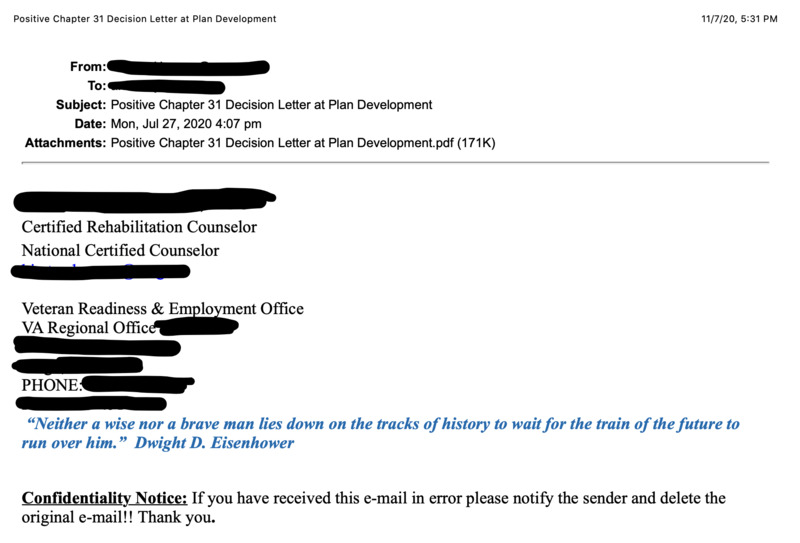 2020-11-07
2020-11-07Positive Chapter 31 Decision Letter During COVID-19
Upon receiving this letter, I was overwhelmed with joy and excitement. 30 years in the military sacrificing time with family, friends, and myself have offered me an opportunity to complete and extend my education. Something that I have always wanted to accomplish but could not because of career choices and defending our country. The attachment to this email is the “Decision Letter” that explains the criteria of how the VA has determined my grant into the Department of Veterans Affairs Education Benefits. It was great news receiving this letter, but receiving it comes after my summer registration and start of class. -
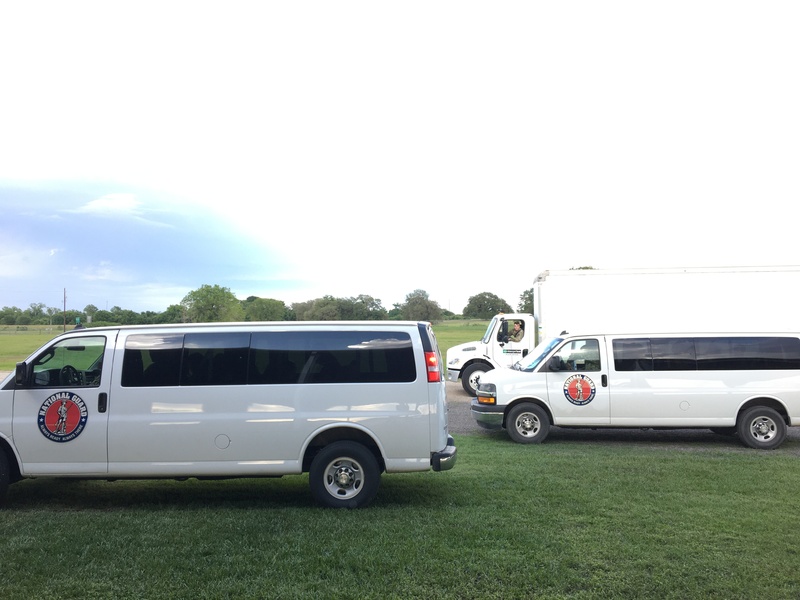 11/03/2020
11/03/2020Peter Bain Oral History, 2020/11/03
An interview of Texas Army National Guardsman Peter Bain who served on both the COVID-19 Relief Mission and the Civil Unrest Mission during the summer of 2020. -
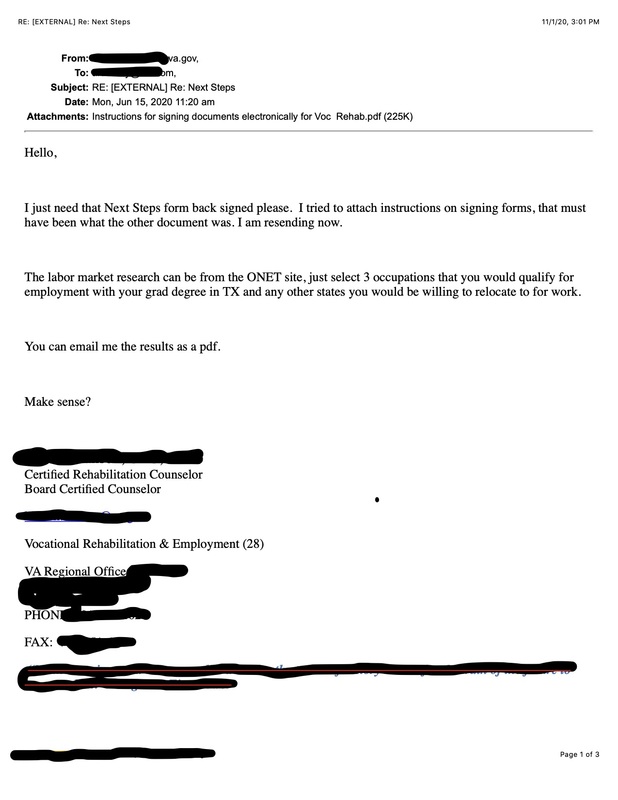 2020-11-01
2020-11-01A Retiree Initiating Vocational Rehab Benefits
Going through the process of applying for my Vocational Rehabilitation assistance, I had to complete a job analysis of the degree that I am pursuing. The VA councilor that was assigned to me is very nice and helpful. Her concern to help me was to either qualify me for a job, or training that would help me with finding a career that would work with my disabilities. This email is secondary to an email sent - instructing me to compare three different states that offer careers in Public History. My goal was to show a growing trend in the field, and Texas was showing the highest from the rest of the country. At this time, I have not been accepted into the Vocational Rehab program, but I am registered to start a summer class and the loans pile up. -
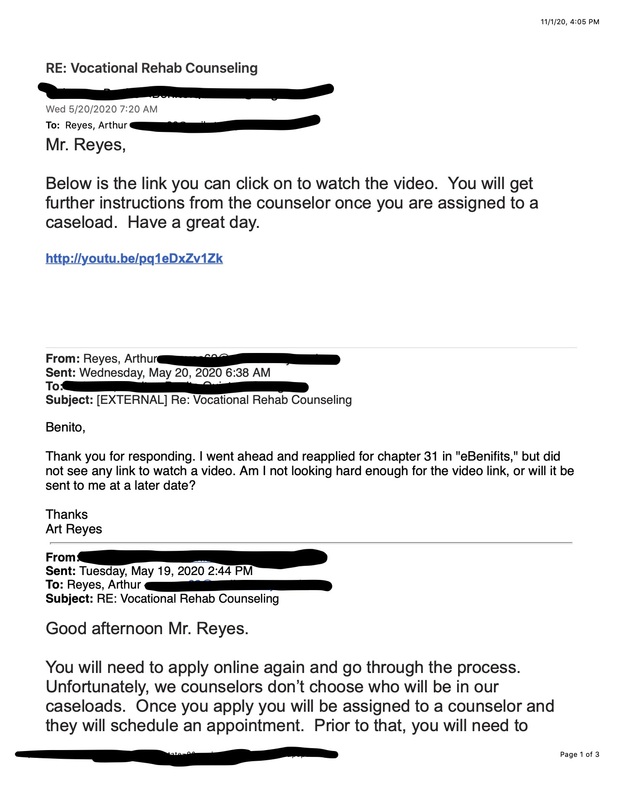 2020-11-01
2020-11-01How Will I Pay for My Master’s as a Retired Reservist with No Income?
After graduating with an undergrad in History in the fall of 2019, my goal was to continue my education in Public History. A Graduate Program had opened recently at St. Mary’s University in my hometown of San Antonio TX. That meant that I did not have to commute to Texas State that was approximately 65 miles away, and an hour drive with no traffic – maybe two hours, or more with traffic. I had exhausted my GI Bill Chapter 33 and did not know how I was supposed to fund my continuing education. My loans were adding up and I was not sure of registering for my master’s degree. Talking with the school’s VA office I was encouraged to contact the Veterans Administration to speak with some one that worked with the Vocational Rehab department; that is something that I had already pursued prior to this event, and I was denied service. This is an email shared between me and a VA representative in the middle of 2020. Communication during the Covid-19 pandemic, and summer vacations was making things tough to complete. With the start of these events I was hoping for financial support for my summer II class. -
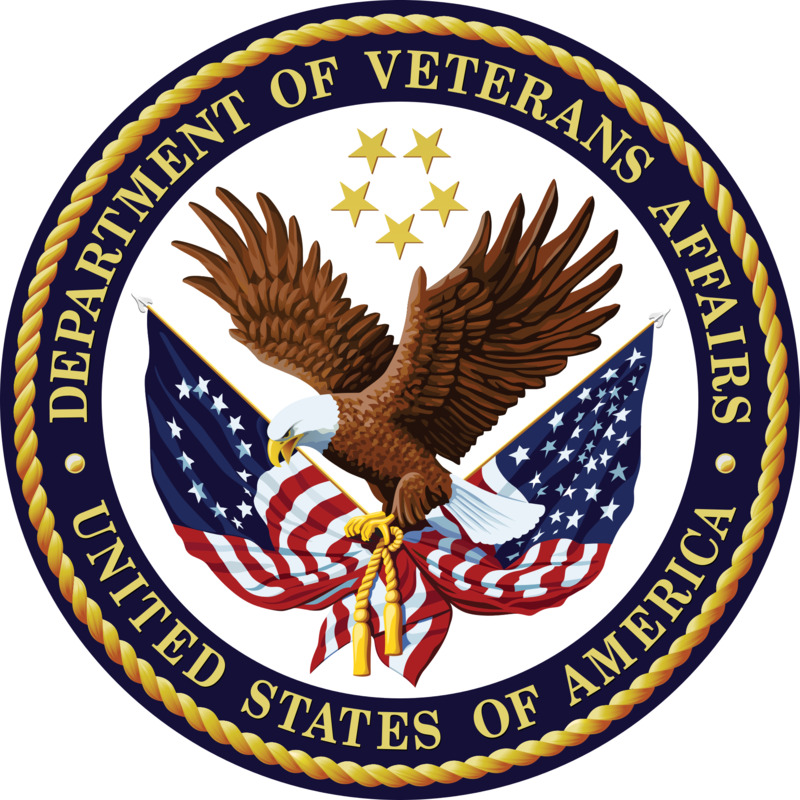 2020-10-27
2020-10-27How has COVID-19 challenged your VA 2020 school registration?
Reaching out to my school's student veterans, I was able to acquire one response. I emailed out a few questions about how the Covid-19 pandemic effected their registration process, and any other thoughts that may pertain to school and the pandemic. Even for myself, trying to find volunteers to participate in this project is difficult; not being able to visit the campus and collaborate with classmates proved I did not have an abundance of volunteers to work with at a moments notice. Before the pandemic we were able to ask for almost anyone's help with school projects, something that seems like a luxury at this time in the middle of Covid-19. I want to thank the individual for participating in my project, and wish them well with their classes throughout this difficult times that we are experiencing. -
 2020-07-14
2020-07-14Grandfather, Son, and Granddaughter Reunited at Last
While serving with the Texas Army National Guard on the COVID-19 Relief Mission in Houston, TX, Josh Farrar was visited by his parents, wife, and daughters when he was given a day off by his Commander. In order to get outside, they all went to the park. This video is of the granddaughter and grandfather playing on a slide while the father (Josh Farrar) interacts with his dad. This video is important as it shows an extended family interacting during the pandemic in an outside venue while a family member is supporting the COVID-19 Relief Mission. This day was very supportive and therapeutic for the Soldier after months dealing with COVID-19 testing. -
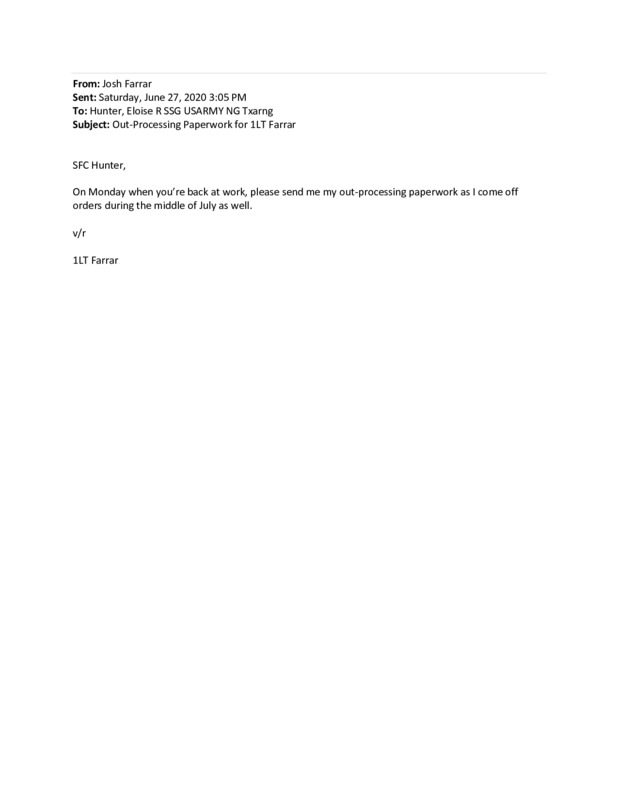 2020-06-25
2020-06-25Coming Off Orders
I served on the COVID-19 Relief Mission for 93 days with the Texas Army National Guard. The attached orders and email detail my timeline on the mission and my preparation in late June to come off orders by my end date of 18 July 2020. I will not give any more details than that when it concerns orders or paperwork for orders in this public forum. I just wanted to add to military and National Guard perspective of this story as thousands of National Guardsman served on the COVID-19 Relief Mission. In Texas, the same rules applied to this mission as to an OCONUS deployment in terms of leaving mission. The orders were also longer than 90 days for most Soldiers which allowed them to earn 50% Post 9/11 G.I. Bill College Benefits if they had never served on Active Duty Orders (outside of training) before. -
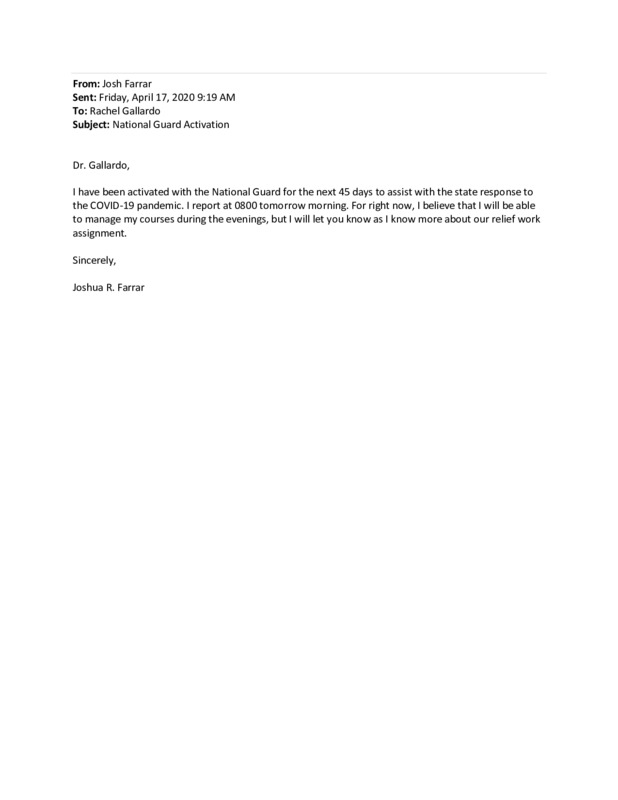 2020-04-17
2020-04-17Student, Instructor, Soldier: Leaving to Help With the COVID-19 Pandemic
During Spring of 2020, I was wearing many hats. I was a 1st Lieutenant in the Texas Army National Guard, a husband, a father of two girls, a PhD student, a research assistant for the department chair of the Texas A&M Anthropology Department, and an Anthropology Instructor at Blinn College. Everything changed on April 17th, 2020 when I was activated with the National Guard on 45 day orders starting at 0800 on April 18th. I packed my bags, told my kids and wife goodbye, and sent emails to my supervisors at Blinn College and Texas A&M University. Two of the emails featured here are the emails that I sent to my supervisors. My orders were initially for 45 days but were later extended to 93 days in total. I sent updates to my supervisors as I learned new information. One update email to Dr. De Ruiter at Texas A&M University is featured in this email collection as well. This is my third activation with the National Guard in the past three years. I have been called to floods, hurricanes, and now a pandemic. Serving the people of the State of Texas is never boring, but it can be difficult on the family and jobs that I leave behind. I hope these emails speak to that struggle. -
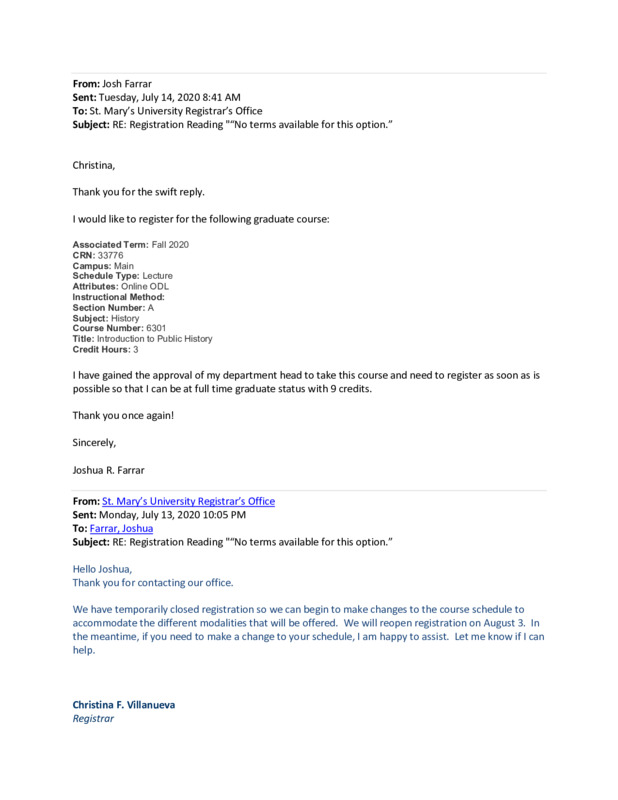 2020-07-14
2020-07-14Registering for Graduate School While Serving in the Military on COVID-19 Orders
While serving in the Texas Army National Guard on COVID-19 Relief Mission orders, I decided to apply to graduate school at St. Mary's University in San Antonio, TX. While on these orders, I ran into registration issues. I was trying to register as a full time student with nine graduate credits, but St. Mary's had born forced to redo their entire Fall 2020 course scheduling due to COVID-19. This is described in detail in the email. At first I asked the registrar: "I am trying to web register for a third course in the fall. When I go to register in Banner, it states “No terms available for this option.” I seem to be in good standing and lack any registration holds that I can see. Is there any way to get my registration unlocked in Banner?" They responded: "We have temporarily closed registration so we can begin to make changes to the course schedule to accommodate the different modalities that will be offered. We will reopen registration on August 3. In the meantime, if you need to make a change to your schedule, I am happy to assist. Let me know if I can help." I had to ask them to manually enter me for this course so that I was signed up for a full time course load in time to meet my funding date commitments. Luckily this situation was sorted out and I was able to attend St. Mary's University full time during Fall 2020. The Fall 2020 semester was interesting though, as St. Mary's as a whole went almost entirely online.
